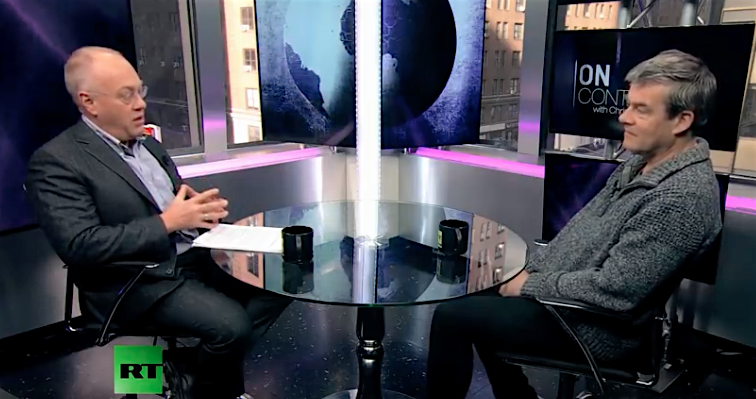Video: I Discuss the Possible Closure of the Prison at Guantánamo Bay on RT America

Please support my work as a reader-funded journalist! I’m currently trying to raise $2500 (£2000) to support my writing and campaigning on Guantánamo and related issues over the next three months. If you can help, please click on the button below to donate via PayPal.
On Tuesday evening, I was pleased to be asked by RT America for an interview regarding the prospects of the closure of the prison at Guantánamo Bay after the release of Abdul Latif Nasser, the first release from the prison under Joe Biden, since he was inaugurated as president six months ago, and the first release for over three years.
Speaking to Scottie Nell Hughes, I explained how the closure of Guantánamo ought to now be within sight, with just 39 men still held, and only twelve of those men facing trials, or having gone through the trial process. Of the 27 others, ten — like Nasser — have also been approved for release, while the 17 others have never been charged, and have been aptly described as America’s “forever prisoners,” a label that no country that claims to respect the rule of law should want clinging to them.
Fortunately, as I also explained, 19 and a half years since Guantánamo opened, there is now a widespread acceptance within the US mainstream political culture that it is unacceptable to continue endlessly holding men who have never been charged with a crime, and, by the government’s own admissions over the years, never will be.
Video: I Discuss Guantánamo with Chris Hedges on His Show ‘On Contact’ on RT America

Please support my work as a reader-funded journalist! I’m currently trying to raise $2500 (£2000) to support my writing and campaigning on Guantánamo and related issues over the next three months of the Trump administration. If you can help, please click on the button below to donate via PayPal.
An injustice does not become any less unjust the longer it endures, and yet, when it comes to the prison at Guantánamo Bay, you could be forgiven for not thinking that this is the case. Over 17 years since the prison opened, it is still holding men indefinitely without charge or trial, and yet these days the prison is rarely in the news, either in the US or internationally.
The is shameful, because, although only 40 men are still held (out of the 779 men held in total by the US military since the prison opened in January 2002), the blunt truth is that no one should be held indefinitely without charge or trial, because that is what dictatorships do, not countries that, like the US, profess to care about the rule of law.
I’m pleased to report that, in an effort to continue to shine a light on the ongoing horrors of Guantánamo, Chris Hedges, one of the most significant critics of America’s current lawlessness, interviewed me for his show ‘On Contact,’ on RT America, which was broadcast on Saturday, and is embedded below via YouTube:
Video: Andy Worthington Discusses Guantánamo’s 17th Anniversary and Gina Haspel’s War Crimes as a Torturer on RT
Please support my work as a reader-funded journalist! I’m currently trying to raise $2500 (£2000) to support my writing and campaigning on Guantánamo and related issues over the next three months of the Trump administration. If you can help, please click on the button below to donate via PayPal.
On my recent US visit to call for the closure of the prison at Guantánamo Bay on and around the 17th anniversary of its opening, I was interviewed for RT in New York on January 15, and have only just found the video, which is posted below. I appeared on ‘News. Views. Hughes,’ which the channel describes as “a special daily afternoon broadcast hosted by journalist and political commentator Scottie Nell Hughes.”
Hughes was a paid CNN commentator and vocal Donald Trump supporter during the 2016 presidential election, and, as GQ explained in an article in 2016, “served as one of Trump’s most faithful and pervasive campaign surrogates” on the campaign trail. Her questioning showed an effort to challenge my assessment of the situation at Guantánamo, but, as a long-standing campaigner for the closure of the prison, it isn’t difficult for me to point out that only dictators hold people indefinitely without charge or trial, and that the American people deserve better from their leaders, who are supposed to have a fundamental respect for the rule of law.
I also discussed the unsuitability of Gina Haspel to be the director of the CIA — something that was abundantly clear to me throughout the period of her nomination an her eventual confirmation, and which I wrote about at the time in two articles, The Torture Trail of Gina Haspel Makes Her Unsuitable to be Director of the CIA and Torture on Trial in the US Senate, as the UK Government Unreservedly Apologizes for Its Role in Libyan Rendition. Read the rest of this entry »
Video: RT America’s One-Hour Special on Guantánamo Featuring Andy Worthington, Joe Hickman, Nancy Hollander and Tom Wilner
 Last week, I was delighted to take part in an hour-long Guantánamo special on RT America, presented by Simone del Rosario, who had recently visited the prison. Simone began by noting that it was the tenth anniversary of three deaths at Guantánamo — 22-year old Yasser Talal al-Zahrani, a Saudi, who was just 17 years old when he was seized in Afghanistan at the end of 2001, 37-year old Salah Ahmed al-Salami (aka Ali al-Salami), a Yemeni, and 30-year old Mani Shaman al-Utaybi, another Saudi.
Last week, I was delighted to take part in an hour-long Guantánamo special on RT America, presented by Simone del Rosario, who had recently visited the prison. Simone began by noting that it was the tenth anniversary of three deaths at Guantánamo — 22-year old Yasser Talal al-Zahrani, a Saudi, who was just 17 years old when he was seized in Afghanistan at the end of 2001, 37-year old Salah Ahmed al-Salami (aka Ali al-Salami), a Yemeni, and 30-year old Mani Shaman al-Utaybi, another Saudi.
The deaths were described by the authorities as a triple suicide, but there have always been doubts about that being feasible — doubts that were particularly highlighted in 2010, when the law professor and journalist Scott Horton wrote an alternative account for Harper’s Magazine, “The Guantánamo Suicides,” that drew in particular on a compelling counter-narrative presented by Staff Sgt. Joseph Hickman, who had been in the prison at the time of the men’s deaths, monitoring activities from the guard towers. Hickman’s book Murder in Camp Delta was published in January 2015, and he was also a contributor to RT America’s show.
After this opening, the show dealt in detail with the case of Mohamedou Ould Slahi, Mauritanian national, torture victim and best-selling author (of Guantánamo Diary). Slahi is one of the prisoners still held who were designated for prosecution by the Guantánamo Review Task Force that President Obama established shortly after first taking office in January 2009, until the basis for prosecutions largely collapsed after a number of critical appeals court rulings and he was, instead, put forward for a Periodic Review Board, the latest review process, which began at the end of 2013. Slahi’s PRB took place on June 2, and, in discussing his case, Simone del Rosario also spoke to one of his attorneys, Nancy Hollander. Read the rest of this entry »













 Who's still at Guantánamo?
Who's still at Guantánamo?
